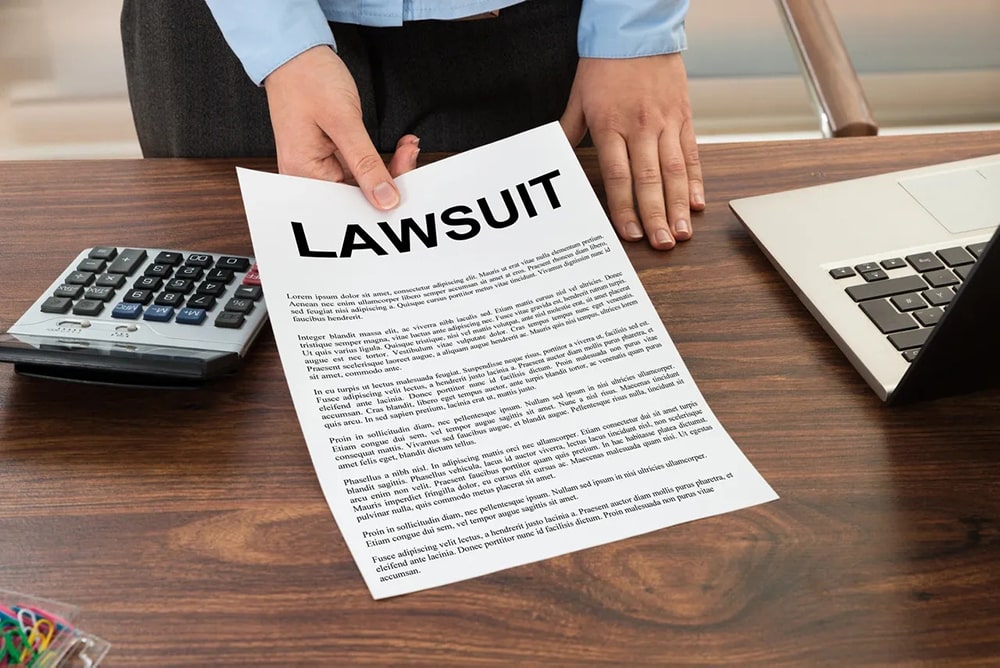Service of process means the other party must receive copies of any paper you file with the court. Learn more about this process and the rules surrounding it in this guide.
Once you have filed your lawsuit against a person, a business, or any other entity, they must be personally served with your claim against them.
The reasoning for this is fairly basic. The defendant in the case (the person or entity you are suing) must be given proper notice and understand the details about the claim against them.
Known as service of process, it is mandatory for any lawsuit to move through the court system. It also gives details how to respond, on when and where the defendant needs to show up in court and defend themselves.
If you’re interested in learning more about this procedure, read on.
Understanding Service of Process
The general rule-of-thumb is that most California lawsuit papers can be served wherever the defendant or witness can be located, whether that be inside California, nationwide or globally, the process or requirements on how to serve them may very by their location.
There are a few documents with exceptions to this general rule, for example, documents with a distance limitation, such as a California State Court Subpoena or an Order for Appearance and Examination are two such documents that fall under this rule.
Another exception to the general rule is a California Small Claims Action, it can only be served inside California unless it falls into one of the two out of state service exceptions for this particular document, the claim results from an auto accident that took place inside California with an out-of-state driver or has to do with an out-of-state landlord who owns property in California.
A third exception to this rule is usually any California legal document that needs to be enforced in another state, like a judgment or collection efforts on that judgment, would require to first make the California judgment valid in the other state through their Sister State Judgment process, the same or a similar process would happen here in California if you needed to enforce a foreign judgment inside California, through a wage garnishment or bank levy.
Following along this rule of needing the ability to enforce someone’s compliance, Out of State Subpoena’s must be made valid and enforceable through the California Out-of-State Subpoena Procedure, you can get a free guide here.
If you serve your foreign subpoena in California without following the procedure and the witness does not comply with it out of the goodness of their heart, you will have no recourse or way to force them to comply with your court order and will have to start over and do it correctly, so it is highly recommended that you follow the procedure from the beginning. This does not apply to Federal Subpoenas.
When it comes to process service rules, the law of the state the paperwork comes from generally determines the service requirements, unless the particular state has a law allowing the use of the foreign states service rules, California is one such state that allows service of our documents using the other states rules if need be.
Generally all defendants must be served with their own set of documents and proof of service provided back to the court, It’s not enough to deliver one set of documents to just one person or entity, when there are multiple defendants at the same location. This applies to married couples, de-facto couples, and business’s that have multiple entity’s or a combination of businesses and individuals being served.
There are several ways in which service of process can be delivered to all individuals/entity’s involved in a lawsuit claim:
1. Personal Service of Process
This is quite self-explanatory, but personal service on an individual involves physically handing service papers to the defendant and personal service on a company requires that you serve a person specifically authorized to accept service on their behalf.
When it comes to who performs this task, you will need to make your selection carefully.
Some of the options for personal service include:
- A marshal, constable or sheriff – This can be a great option if the situation is right, they are generally the cheapest option but here in California many sheriffs departments no longer serve civil process or only attempt to serve what they are court mandated to serve, like Restraining Orders for someone with a fee waiver.
Their hours may be limited, say 9:00am to 3:00pm or a limited number of attempts, maybe 3 attempts to deliver your documents and then they will close out your assignment. The sheriffs department does not have a rush or expedited option, it can take them a week or two to make an attempt.When hiring the sheriff’s department to serve your important legal documents, make sure you understand that you are hiring someone who this is not their primary job, that they do day in and day out.
- Private process servers or here in California a Registered Process Server – A process server is 18 years old or older, has undertaken a Department of Justice background check to confirm they have no felonies and is registered and bonded ($2000 Bond) in their local county and qualified to serve legal papers anywhere in California.
Generally a private process server is going to be more expensive than the sheriffs department or a friend… who can really compete with free?
The industry standard in California is 6 attempts but some companies or Registered Process Servers will make significantly more attempts to serve your documents at a single valid address.
There are no laws that specifically limits the hours that process servers are not allowed to deliver documents during but we have found a law that limits law enforcement from enforcing misdemeanor warrants between the hours of 6:00am and 9:00pm, so that tends to be a good rule of thumb but RPS can always stake out an individual’s home or business and catch them outside those times.
Most if not all process serving companies have Rush, Same Day or Expedited services available and Routine Services will be attempted generally every 3 to 7 days.
Every company and server will have their own prices, procedures and requirements to do business with them, so working with one company could be completely different working with another, so make sure to get all your questions answered before choosing a Process Server to work with.
- A Friend or a Relative – In California anyone 18 or over, not a party to the action can serve most legal papers.
There a a couple exceptions, generally an Application and Order for Examination, Bank Levy, Earnings Withholding Orders and anything with a writ… Writ of Execution, Writ of Possession or a Writ of Attachment can only be served by a Registered Process Server or the Sheriff’s Department.
A friend or a relative may be available at the moment when you need them to serve the documents and can be a great person to use if the defendant it cooperative but your friend will not know what to do or what is good service if the defendant does not willingly take the papers or attempts to avoid service.
Also if you decide to pay someone who is not a sheriff or Registered Process Server, those costs are not recoverable and can not be added into your judgment, the defendant will not be required to pay those fees back to you like they would using one of the above.
2. Substitute Service of Process
Substitute Service in California is where you are allowed to leave the documents with another resident or person in charge, 18+ years old, at the defendants usual place of abode (home address), business or usual place of mailing and completed by mailing a copy of the legal papers to the defendant by first class mail.
Some subservable documents can be served on the first attempt and others require specific due diligence attempts before you can leave them with someone other than the named defendant.
Not every document can be subserved, so make sure to check with your attorney, court clerk, or process server to confirm the service requirements for your specific documents.
3. Service of Process via Certified Mail
In some states, you can serve lawsuit papers to a defendant via certified mail with a verified return receipt. This return receipt is important as it proves the mail was delivered, signed for, and received by the defendant.
In some specific states, service of process via certified mail is a mandatory first step in delivering papers to a defendant. If this process is unsuccessful, another method of service can be used.
In California service by certified mail is limited, generally small claims papers can be served by certified mail, if only the defendant signs for them and their signature is legible to the court that they were the one signing for the documents. Only a court clerk can certified mail the documents to the small claims defendant.
California divorce papers are allowed to be served outside of California through certified mail but not inside California.
In the eviction process, if you obtain a posting order for an Unlawful Detainer action, you are required to mail the documents by certified mail but the defendant is not required to sign for them for service to still be considered completed.
This method of service is one of the easiest and most affordable. However, studies show that it is the least effective way to get your court papers delivered.
4. Service of Process via First Class Mail
Service of process can be delivered by regular first class mail in some instances. Generally in California it is used if you are responding to an action you were served with, for example a Response-Marriage or an Answer to a civil or unlawful detainer action would all be served by first class mail but make sure you follow the proper procedures and include the correct proof of service with the mailing.
First class mail delivery is only accepted in a select few states, and only certain documents may allow for service by first class mail, so it’s important to double-check whether your state accepts this as a form of delivery.
When filing your claim, simply check with the court clerk whether this form of delivery is accepted in your state.
5. Service of Process via Commercial Mail Receiving Agency “CMRA”
Service of legal documents is allowed at a Commercial Mail Receiving Agency or “CMRA” in California, such as The UPS Store, PostalAnnex and many of the other independent CMRA’s that cover our state.
We will dive deep into this kind of service in another blog post but for now this is considered a substitute service at the subjects Usual Place of Mailing.
This is applicable if you simply cannot find an accurate home or work address in order to deliver the paperwork.
Service is not allowed in California through a United States Post Office Box but, if you know the defendant’s post office box number, you may be able to source a street address from this.
If you fill out a Request for Box Holder Information stating that you need the defendant’s address solely for the delivery of legal paperwork. This statement must be completed at the post office that the defendants post office box is located at and will provide you with the address they currently have on file with the post office, this may not be the actual physical address for your defendant.
Generally, there is no fee charged by the post office for the issue of this information.
Need Professional Process Serving?
At D&R Legal Process Service, LLC. we offer expertise in the field of Process Serving throughout the state of California.
We also offer assistance in the field of Private Investigation, Eviction Services, and both State and Federal Subpoenas.
Feel free to call us anytime at 1-510-797-9996!









